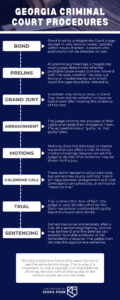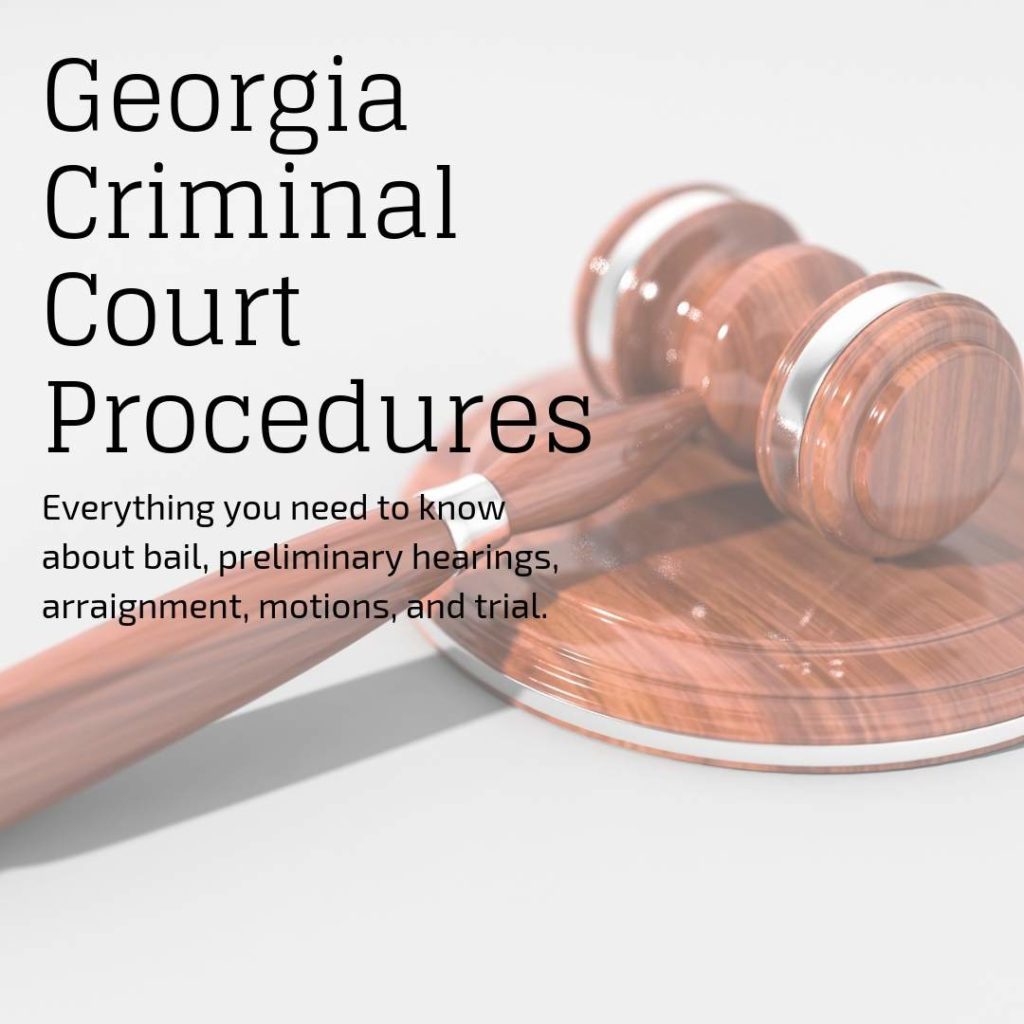There are many different kinds of hearings in Georgia criminal cases, including Bond Hearings, Preliminary Hearings, Arraignments, Motions Hearings, Calendar Call, Trials, and Sentencing Hearings. While some Georgia Courts use slightly different vocabulary or handle multiple types of hearings at a single court date, most follow the same general procedures.
Bail & Bond
When a person is taken into custody, the first judge he or she will see is typically a Georgia Magistrate Court Judge. Magistrate Court Judges set bond in most cases within hours of arrest. This is often a straightforward proceeding, as many jurisdictions set bond according to a “bond schedule.” This means that each offense will have bond amount assigned to it, and unless special circumstances exist, the person will be released upon posting that amount on bond.
There are exceptions to this, however. O.C.G.A. § 17-6-1 makes exceptions for certain very serious offenses, including:
- Treason;
- Murder;
- Rape;
- Aggravated sodomy;
- Armed robbery;
- Home invasion in the first degree;
- Aircraft hijacking and hijacking a motor vehicle in the first degree;
- Aggravated child molestation;
- Aggravated sexual battery;
- Manufacturing, distributing, delivering, dispensing, administering, or selling any controlled substance classified under Code Section 16-13-25 as Schedule I or under Code Section 16-13-26 as Schedule II;
- Violating Code Section 16-13-31 or Code Section 16-13-31.1;
- Kidnapping, arson, aggravated assault, or burglary in any degree if the person, at the time of the alleged kidnapping, arson, aggravated assault, or burglary in any degree, had previously been convicted of, was on probation or parole with respect to, or was on bail for kidnapping, arson, aggravated assault, burglary in any degree, or one or more of the offenses listed in paragraphs (1) through (10) of this subsection;
- Aggravated stalking; and
- Violations of Chapter 15 of Title 16 (Offenses dealing with Criminal Street Gangs).
For these offenses, bail can only be set by a Georgia Superior Court Judge. In order to request bail, the accused person must petition the Superior Court requesting bail, and a hearing must be set within ten days of the receipt of the petition.
In a bail hearing, the judge may release a person on bail if:
- The person is not a flight risk;
- The person is not a danger to others, to the community, or to property;
- The person does not pose a significant risk of committing a felony before trial; and
- The person does not pose a significant risk of intimidating witnesses or otherwise interfering with the judicial proceedings.
However, for individuals charged with serious violent felonies who have prior convictions for serious violent felonies, the presumption is against release. This is a rebuttable presumption, meaning if significant evidence is presented to ensure that the person can safely be released, the judge may release the individual.
Preliminary Hearings
What happens at a Georgia Preliminary Hearing? Preliminary hearings also occur before a Georgia Magistrate Court Judge. At preliminary hearings, the judge is charged with determining whether a crime has been committed and whether the accused person is the one who committed it. The magistrate court judge also determines whether the crime is a felony or a misdemeanor and refers the case to the appropriate court. The purpose of a preliminary hearing is not to determine whether a person is guilty of a crime beyond a reasonable doubt, but rather whether sufficient evidence, known as probable cause, exists to move forward with proceedings. Witnesses may be cross-examined on their testimony. A preliminary hearing can be a valuable opportunity for your Georgia Criminal Defense Attorney to cross-examine the State’s witnesses and pin their stories down.
Note: At preliminary hearings, hearsay is admissible. This means that witnesses may testify to things about which they have no first-hand knowledge. For example, they may testify as to what other individuals, who are not present in court, told them.
Georgia Grand Jury
In capital cases or cases that can result in either the death penalty or lengthy terms of imprisonment, the case must be presented to a Grand Jury. The Grand Jury may, upon hearing evidence in the case, issue an indictment, or, if they find insufficient evidence, “no bill” the case.
O.C.G.A. § 17-7-70.1 allows for prosecution by accusation for misdemeanors and less serious (non-capital) felony offenses. An accusation must take the proper form set out in O.C.G.A. § 17-7-71 and must properly inform the accused of the charges against him or her. The District Attorney may not proceed by accusation in a case that was presented to a Grand Jury and “no-billed.”
Arraignment
At arraignment, the judge informs the accused of his or her rights and reads aloud the accusation or indictment. The accused then enters a plea of “guilty” or “not guilty.” It is generally not advisable to enter a guilty plea at arraignment, and should never be done without consulting with a Georgia Criminal Defense Attorney, even if charges are relatively minor.
Different jurisdictions handle arraignment differently. Some courts will allow lawyers to file a “Waiver of Arraignment” on behalf of their clients, negating the need for either the attorney or the client to appear at arraignment. Other courts will allow the attorney to appear without the client and verbally enter a “not guilty” plea on the client’s behalf. Still other courts require both attorney and client to be present to verbally enter a plea.
If the accused enters a “not guilty” plea at arraignment, the case will either be set down for motions or trial.
Motions
Motions are an invaluable tool in Georgia Criminal Defense Lawyer‘s arsenal. Most courts hear motions on a separate court date prior to trial, with the understanding that motions can be dispositive of the case. Others hear them just before trial.
There are many different kinds of motions. Attorneys file discovery motions wherein they request the disclosure of information that the State intends to use against an accused person at trial. Discovery motions do not usually necessitate a hearing — in most cases, the State simply turns the information over prior to trial.
The most common motions hearings that occur prior to trial deal with motions to suppress. In a motion to suppress, the attorney makes the argument that a certain piece of evidence is inadmissible because it was illegally obtained. The State bears the burden of proving that evidence was properly obtained. Witnesses (usually law enforcement) are brought to court and asked to testify about how they obtained the evidence. They are subject to cross-examination. At the end, both sides make their arguments to the court, and the judge decides whether such evidence is admissible at trial against the accused.
Calendar Call
Some jurisdictions hold what they call “calendar call” or “catch-all” days between arraignment and motion. They do this with the understanding that many cases end up with an accused person pleading guilty rather than going to trial in the case.
If a case concludes with a plea, the Court will typically complete sentencing on the same day.
Trial
Trials may be either jury trials or bench trials. The jury is the “trier of fact,” meaning it is the jury’s job to determine the credibility of witnesses and the sufficiency of the evidence. In Georgia State Courts, which deal with misdemeanor and traffic offenses, juries are comprised of six jurors. In Superior Courts, juries are made up of twelve jurors. In a bench trial, there is no jury, and the judge sits as the trier of fact. At trial, the State bears the burden of proof and must prove an individual guilty beyond a reasonable doubt. The State presents its case first, and the defense may cross-examine all of the State’s witnesses. The Defense then presents its case, and the State may cross-examine the Defense’s witnesses. Both sides are allowed time to give a closing argument. The jury (or judge, in a bench trial) then decides whether the accused is guilty or not guilty.
Sentencing
Sentencing is sometimes completed on the day of trial. In many serious cases, however, sentencing will be postponed and conducted at a later date. This gives the attorneys time to prepare to make their case to the judge. The State will typically give victims the opportunity to make victim impact statements, which the judges takes into account at sentencing. The defense may bring in character witnesses to give the judge a clearer idea of who their client really is. At the end, the judge decides the most appropriate sentence in the case.
To wrap things up…
Not all courts operate the same, even in the same state (or even the same county). State courts operate differently than Superior Courts, and both of these are different from probate and municipal courts. This is why it is so important to hire a lawyer who knows the jurisdiction where your case is being heard. Confidence and credibility send the right message to judges, and help you get the best outcome in your case. If you have questions about a criminal matter or criminal court procedures in Georgia, call me today.

